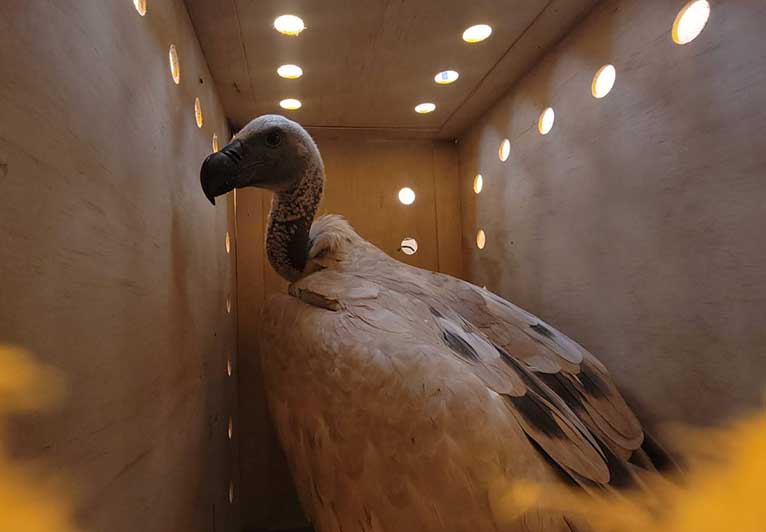The first phase of a project to secure the future of wild vulture populations in southern Africa has been successfully completed with 160 Cape and African White-backed vultures settled into their new home at Shamwari Private Game Reserve.
The birds are the vanguard of a two-year project to establish a breeding facility, VulPro at Shamwari, for sick or injured vultures which have been rehabilitated and are able to breed, but are non-releasable.
In what is the largest relocation of vultures ever undertaken, the birds were transported the 1 042km from VulPro’s facility in Hartebeespoort to bespoke enclosures at Shamwari.
The move involved over 50 people and took 18 hours, with all 160 birds loaded in just three hours. Logistics company DHL provided transport and security, while WeWild Africa, an NGO specialising in animal rewilding and translocation, loaded the birds and funded the 160 transport crates. Prof Katja Koeppel from the University of Pretoria’s faculty of veterinary sciences managed the welfare of the birds, supported by Dr Johan Joubert from Shamwari.
A second phase, later this year, will see the relocation of breeding pairs of non-releasable Lappet-faced, White-headed and Hooded Vultures and some additional White-backed Vultures.
The Cape Vulture offspring will be released at Shamwari in keeping with its ethos of restoring the indigenous fauna and flora on the 250km2 reserve to what it once was. All these birds will be fitted with tracking devices.
Offspring from the other species will be transported back to VulPro’s Hartebeespoort facility where they will be sent to release sites that the National Vulture Breeding Steering Committee has identified as areas where these species need bolstering and support.
Kerri Wolter, VulPro CEO, says the bespoke breeding facility at Shamwari, will provide a significant boost to vulture conservation efforts in southern Africa and on the continent.
“VulPro at Shamwari offers a safe, well-balanced ecosystem for both our in-situ and ex-situ conservation programmes and provides financial support and sustainability. Importantly it limits risk because the largest captive breeding population of vultures isn’t concentrated in one location. In addition, Shamwari’s anti-poaching unit provides good security.”
VulPro is the only vulture conservation organisation of its kind on the continent and is spearheading population restocking and supplementation to address the severe decline of African vulture species.
Human encroachment has particularly impacted African savanna raptors, with a recently published study in Nature Ecology & Evolution by Dr Phil Shaw et al showing evidence of widespread population collapse.
According to the study, raptors, including vultures, are slow-breeding apex predators and scavengers whose disappearance can trigger extreme cascading events. Large raptors experience significantly steeper declines than smaller species.
“Many of Africa’s raptors are at considerable risk from habitat conversion, prey-base depletion and persecution, driven principally by human population expansion,” says the study.
The many threats they face include shooting, trapping, intentional and unintentional poisoning, killing for food or belief-based uses, electrocution and collision with infrastructure such as wind turbines.
The study also found that species in unprotected areas faced declines that were more than double than that of birds in protected areas. For this reason the researchers strongly supported the expansion of conservation areas.
All five of the vulture species named in the study, including the White-backed, White-headed and Hooded Vultures are considered critically endangered, with the exception of the Lappet-faced Vulture which is endangered.
VulPro at Shamwari comprises three enclosures. One accommodates badly injured birds that require constant attention and is off public view near the veterinary hospital. A second, adjacent to the existing Wildlife Rehabilitation Centre, includes an artificial cliff to provide optimal conditions for breeding pairs of Cape Vultures. The third is a pre-release enclosure, built on high ground near the centre of the reserve, from where healthy, young Cape Vultures will be released.
Further enclosures will be added over the next three years.
Joe Cloete, Shamwari CEO, considers the establishment of these enclosures a major milestone in the reserve’s 32-year history.
“To put it in perspective, in conservation terms I consider this as significant as relocating 160 rhino. Vultures are vital for a healthy ecosystem and are severely threatened. I cannot overstate how reintroducing Cape Vultures to Shamwari is crucial to our conservation journey and enhancing the ecological importance of the reserve and the Eastern Cape.”

